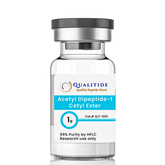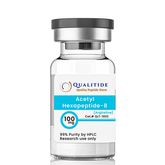The Role of Peptides for Research in Drug Development & Innovation

Peptides are essential in scientific research, contributing significantly to drug development and medical innovation. These small chains of amino acids act as building blocks in biological processes, making them valuable tools for researchers in studying diseases and developing targeted treatments. As the demand for specialized compounds grows, finding a trusted online store for research peptides becomes crucial for laboratories and institutions working on groundbreaking discoveries.
How Peptides Contribute to Drug Development
Peptides have gained attention in pharmaceutical research due to their unique ability to mimic natural biological functions. Unlike traditional small-molecule drugs, peptides can interact with specific cellular receptors, triggering precise biological responses. This ability makes them useful for developing new medications with fewer side effects and higher therapeutic efficiency.
Researchers use peptides to study various diseases, identify new drug targets, and enhance existing treatments. Their role in drug discovery includes:
-
Target Identification: Scientists use peptides to explore how different compounds interact with biological systems, leading to the identification of new drug targets.
-
Improved Drug Formulations: Peptides help researchers create drug formulations that enhance stability, absorption, and effectiveness.
- Minimizing Side Effects: Their precision in targeting specific pathways allows for fewer off-target effects compared to traditional drugs.
Peptide-Based Therapies in Medical Innovation
The use of peptides in medicine has revolutionized treatments in various fields. Their ability to modulate biological functions has led to the approval of peptide-based drugs for numerous conditions, and ongoing research continues to expand their applications.
Key Areas Where Peptides are Making an Impact:
- Oncology
· Cancer researchers use peptides to develop therapies that inhibit tumor growth and stimulate the immune system to fight cancer cells.
· Peptides are also used in imaging techniques to detect cancer at early stages.
- Neurological Disorders
· Scientists explore peptides as potential treatments for Alzheimer’s disease (AD), Parkinson’s disease (PD), cerebral stroke, traumatic brain injury and multiple sclerosis.
· Their ability to cross the blood-brain barrier makes them suitable candidates for neuroprotective drugs.
- Diabetes and Metabolic Research
· Peptides contribute to the development of insulin analogs that offer better blood sugar control.
· They also play a role in obesity treatment by regulating appetite and metabolism.
- Antimicrobial and Antiviral Therapies
· Researchers study peptides as potential antibiotics to combat drug-resistant bacteria.
· Peptides are also investigated for antiviral treatments, including therapies for HIV and influenza.
Advancements in Peptide Research
The evolution of peptide synthesis techniques has led to the production of more stable and effective compounds. Researchers now have access to peptides with improved half-life, better bioavailability, and enhanced resistance to enzymatic degradation. These advancements make peptides more reliable for drug development and expand their applications in therapeutic treatments.
Peptides are also being explored in nanotechnology, where they are combined with nanoparticles for targeted drug delivery. This technique allows medications to be directed precisely to affected cells, reducing the required dosage and minimizing side effects.
Choosing Quality Peptides for Research
Selecting high-quality peptides is essential for achieving accurate and reproducible results in scientific studies. Researchers must ensure that the peptides they use meet industry standards and maintain consistency in their experiments. Key factors to consider when sourcing research peptides include:
- Purity and Composition: High-purity peptides provide reliable data and reduce the risk of experimental errors.
- Manufacturing Standards: Reputable suppliers follow strict quality control measures, ensuring product consistency.
- Comprehensive Documentation: Peptides should come with detailed specifications and lab reports to verify their properties.
Future Potential of Peptides in Drug Innovation
The continuous advancements in peptide research are paving the way for new therapeutic solutions. Scientists are exploring peptide-based vaccines, personalized medicine, and bioengineered peptides for enhanced treatment effectiveness. The pharmaceutical industry is also investing in peptide-conjugated drugs, which combine peptides with other molecules to improve drug stability and performance.
As research expands, peptides are expected to play an even greater role in regenerative medicine, immune therapies, and precision drug delivery. Their versatility makes them one of the most promising tools in modern drug development.
Qualitide scientists have been dedicated to peptide research for over 20 years. Specifically, we have engaged in developing peptides as therapies for a variety of neurological disorders, such as cerebral stroke, Alzheimer’s disease, traumatic brain injury, multiple sclerosis and other conditions. We developed an extensive library of apolipoprotein E-mimetic peptides. If you are interested, please Contact Us, we would be happy to collaborate.
Ending Note:
Qualitide specialize in providing high-quality research peptides to support scientific advancements. With years of experience in peptide research, our products meet strict industry standards, ensuring reliability and precision in every study. Our extensive selection allows researchers to find the right compounds for their specific needs. We also offer research peptides, supporting various studies in skin health, anti-aging, and cellular repair. If you are looking for reliable peptides for your research, explore our collection today. Contact us to learn more about how our products can enhance your scientific work.











